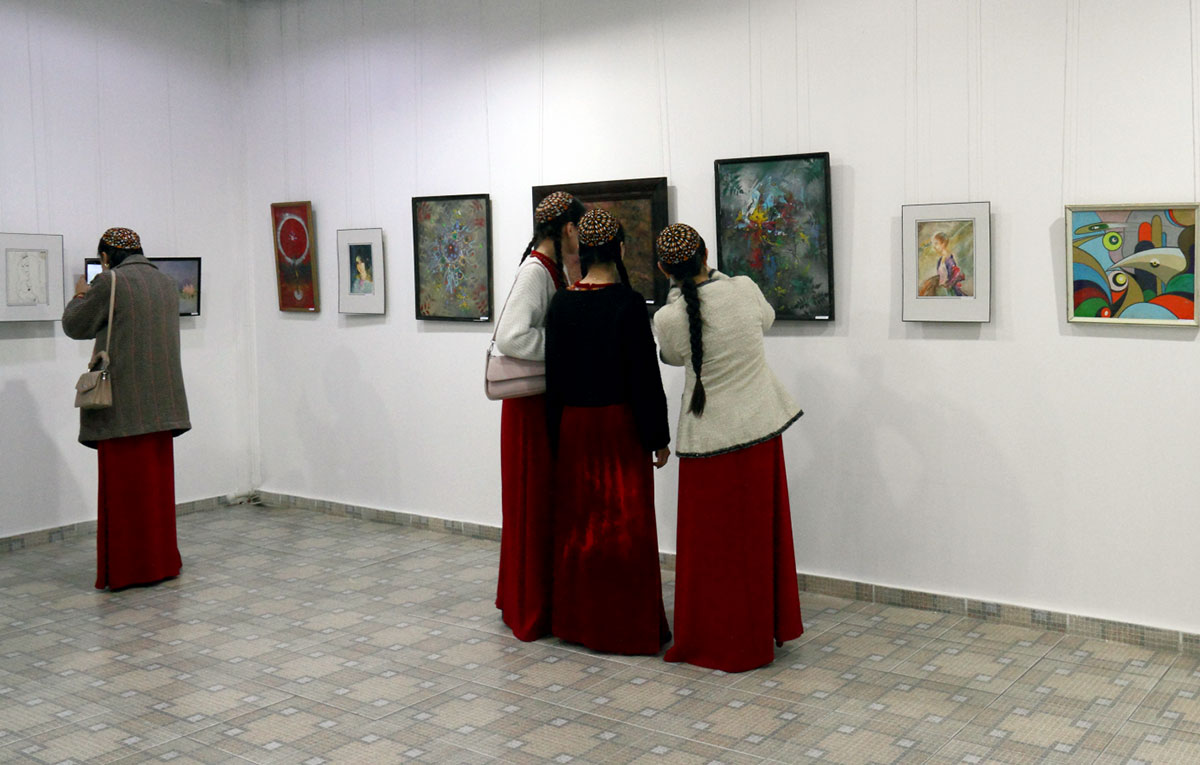Today, in Turkmenabat city, on the occasion of the inclusion of the Amul fortress in the site “The Great Silk Road: Zarafshan-Karakum Corridor”, included on the UNESCO World Heritage List, the International scientific and practical conference “The Ancient Fortress of Amul: Keeper of the Secrets of the Past” was held.
The organizers of the event, held in the year “The Fount of the Wisdom of Magtymguly Fragi,” were the country’s Academy of Sciences, the National Commission of Turkmenistan for UNESCO and the khyakimlik of Lebap velayat.
It should be noted that on March 10–12, 2010, in Turkmenabat city, on the initiative of Hero-Arkadag Gurbanguly Berdimuhamedov, the International Conference “Heritage of Eastern Turkmenistan in the System of Medieval Cultures,” dedicated to the Amul fortress, was held. The scientific views expressed at the forum about the place of the fortress in world culture aroused great interest among the international scientific community.
As is known, the decision to include the site “The Great Silk Road: Zarafshan-Karakum Corridor” on the UNESCO World Heritage List at the proposal of Turkmenistan jointly with the Republics of Uzbekistan and Tajikistan was made on September 17, 2023 at the extended 45th session of the UNESCO World Heritage Committee in Riyadh (Kingdom of Saudi Arabia). The corresponding certificate was presented to the Turkmen side by the UNDP Resident Representative in Turkmenistan Narine Sahakyan on December 27, 2023 during the International Scientific and Practical Conference and Exhibition dedicated to the results of the year “Happy Youth with Arkadag Serdar”.
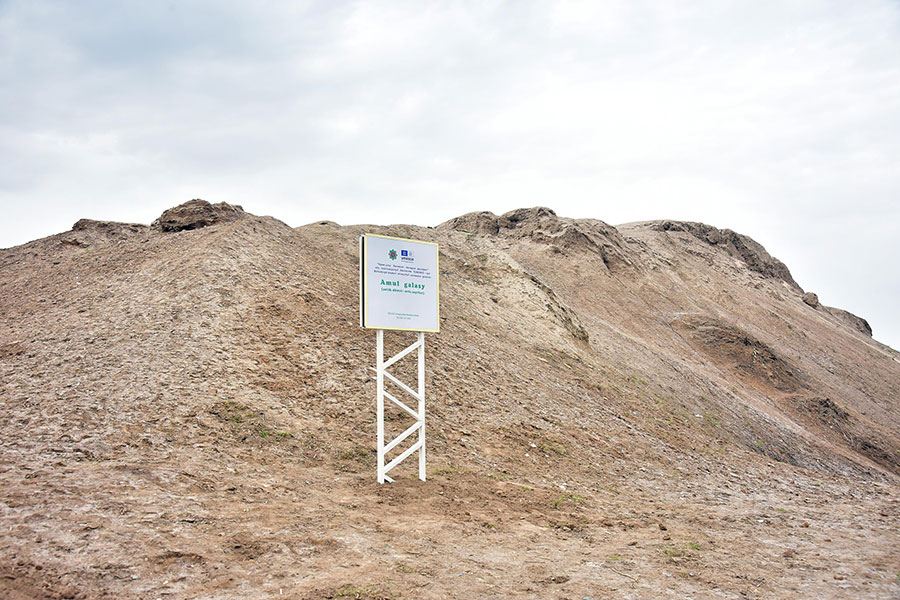 |
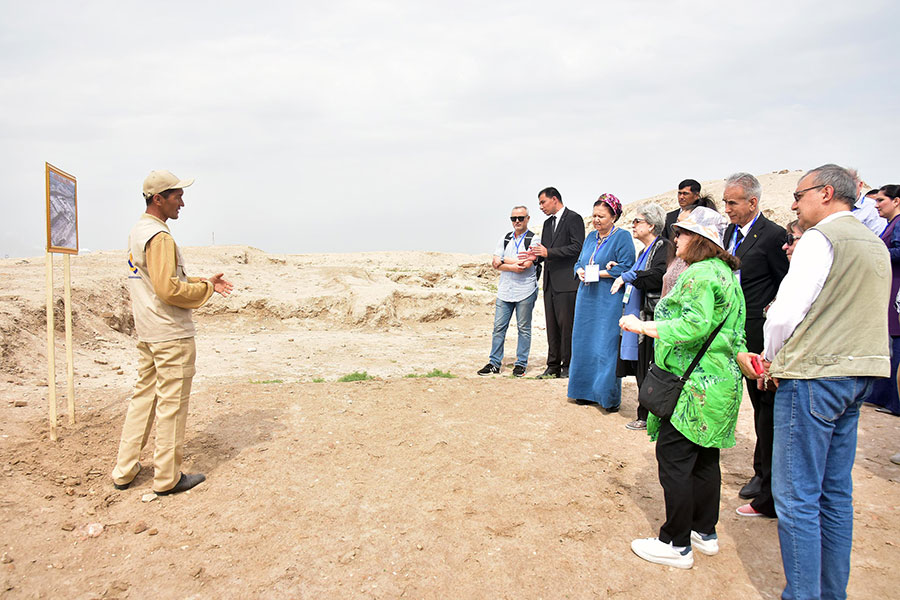 |
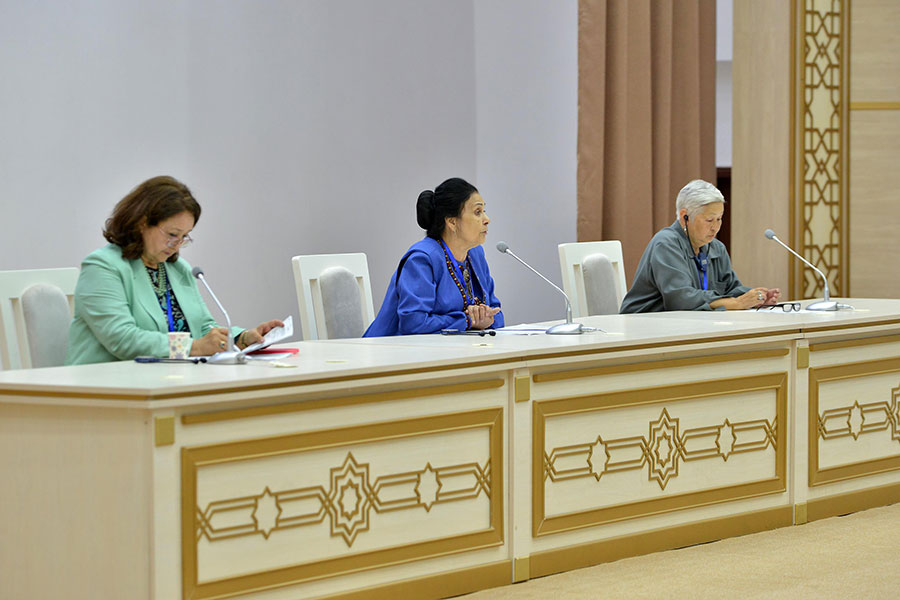 |
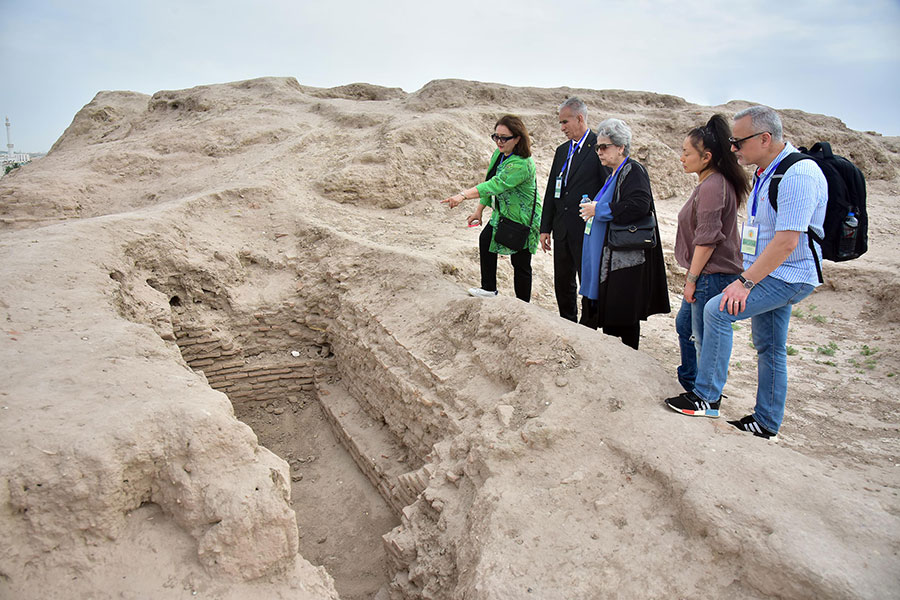 |
Currently, thanks to the support of President Serdar Berdimuhamedov, cooperation with the United Nations Educational, Scientific and Cultural Organization (UNESCO) is being further strengthened. At a meeting of the Cabinet of Ministers held on March 7, 2024, the head of state emphasized that the careful preservation and popularization of our national heritage in the world, including historical monuments located on the territory of Turkmenistan and included in the World Heritage List, are one of the main directions of the implemented state politicians.
The accession of Turkmenistan to the UNESCO Convention for the Protection of the World Cultural and Natural Heritage, to other numerous documents of this Organization, the approval of the Convention for the Safeguarding of the Intangible Cultural Heritage of UNESCO indicate the deepening of targeted work on the development of interstate relations and the expansion of partnerships within the Community of Nations, as well as the significant contribution to human development. The repeated election of our country as a member of the Executive Board of this structure, the signing of the Memorandum of Cooperation between the Government of Turkmenistan and UNESCO became a high assessment of the ongoing activities in the field of protection of cultural and natural heritage.
Attracting the attention of the world scientific community to the ancient Amul fortress, which is a strategically important point on the route of the Great Silk Road, creating an appropriate platform through excavations and research, widespread popularization of the information obtained, and the development of cultural diplomacy are the main goals of the current Forum.
Famous Turkmen and foreign historians, archaeologists, ethnographers, orientalists, professors and young scientists, as well as experts, including from Great Britain, the Russian Federation, the Republic of Tatarstan of the Russian Federation, Kazakhstan, Kyrgyzstan, Tajikistan, Uzbekistan, who were warmly welcomed on the hospitable Turkmen land.
As part of the Forum, on the eve of the Forum, its delegates visited an open-air monument – the Amul ancient settlement, located in the southern part of Turkmenabat city, 619 meters from the Turkmenabat-Kerki highway, and got acquainted with the architectural structure of the site. The exhibits of the Historical and Local Lore Museum of Lebap Velayat, related to ancient life, aroused great interest among the guests – jewelry, carpets, copper, earthenware and wooden utensils, national clothes made of keteni fabric, musical instruments, tools. The object of admiration was a 150-million-year-old stone footprint of a dinosaur from Hojapil village. At the end of the excursions, a concert was held at the State Music and Drama Theater named after Seyitnazar Seydi with the participation of masters of art from our country.
The conference was preceded by a thematic exhibition dedicated to the ancient Amul fortress, which attracts the attention of researchers as an archaeological and ethnographic site.
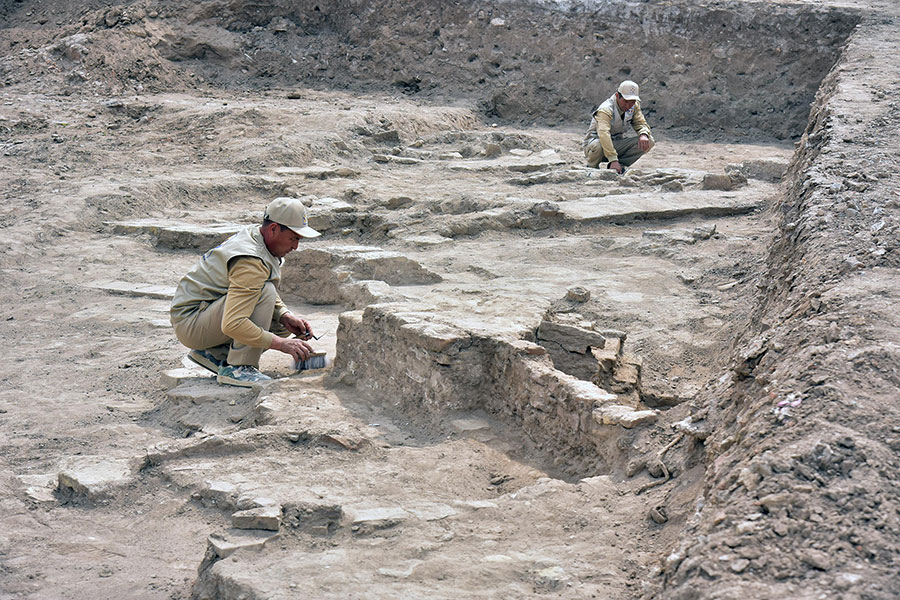 |
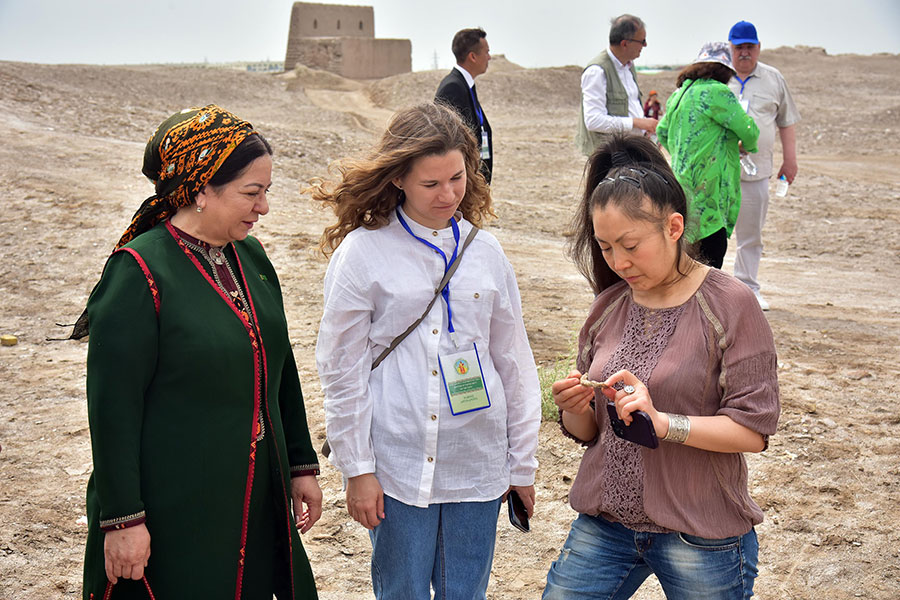 |
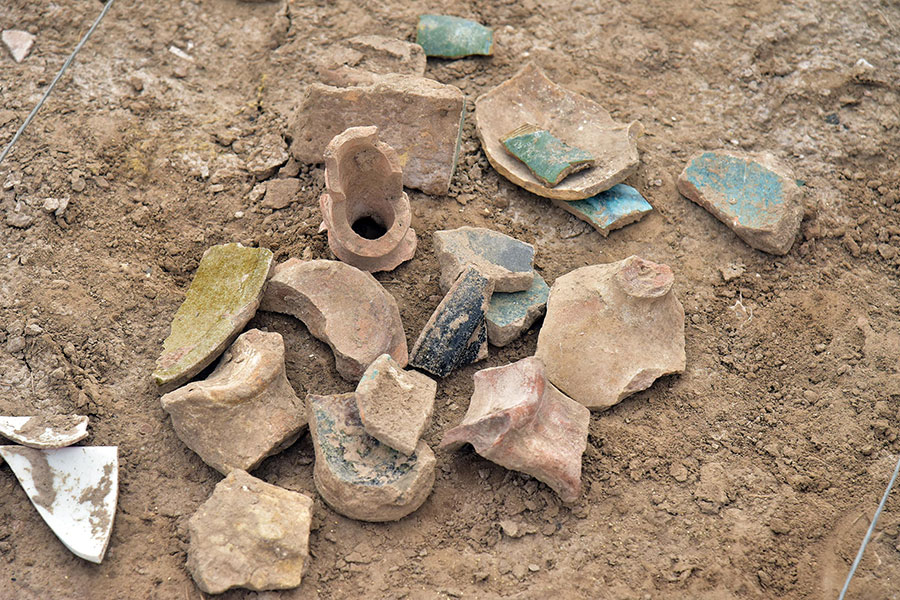 |
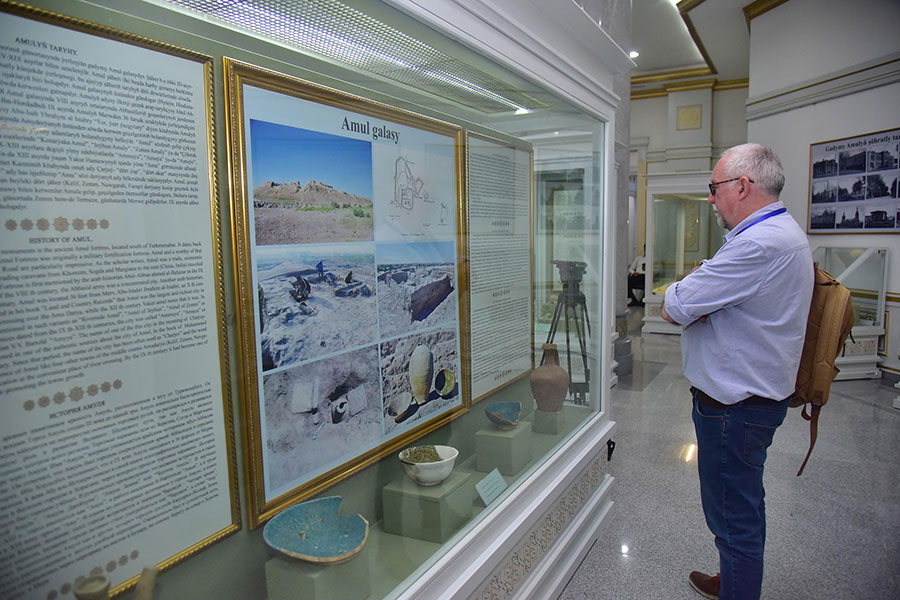 |
With great attention, the participants listened to the welcoming Address of President Serdar Berdimuhamedov, which emphasized that the current Forum is called upon to play a decisive role in revealing the influence of the Amul fortress on the development of civilization and in expanding international cooperation in this area.
The message of the head of state notes that the cultural values of our people, as well as their ideals of humanism, have significantly enriched the treasury of humanity and are reflected in the World Heritage List. They have been improved over the centuries. Our national culture allows us to take an excursion into the past and study the mutual influence of different cultures for their subsequent development. Turkmenistan is an ancient land where sciences, schools, civilizations and various types of art arose and flourished. Moreover, this is fully confirmed by the cultural layers identified in the Karakum Desert, endless steppe expanses, foothills and gorges, along once murmuring river beds, in grottoes and sites, as well as ancient settlements, fortifications of bygone times and complexes of monuments.
The forum participants stated that Turkmenistan has established itself as one of the active partners of the UN specialized structure, participating in many of its projects and programs aimed at developing international humanitarian and intercultural relations. The great importance attached to traditional dialogue focused on the long term is clearly evidenced by the activities of the National Commission of Turkmenistan for UNESCO.
The legal basis for fruitful cooperation is being consistently strengthened. Up to date, Turkmenistan has ratified 12 UNESCO Conventions in a number of important areas.
Particularly noted is the active work ongoing in the country to implement the UNESCO World Heritage program, aimed at preserving and popularizing natural or man-made sites of special cultural, historical or environmental significance.
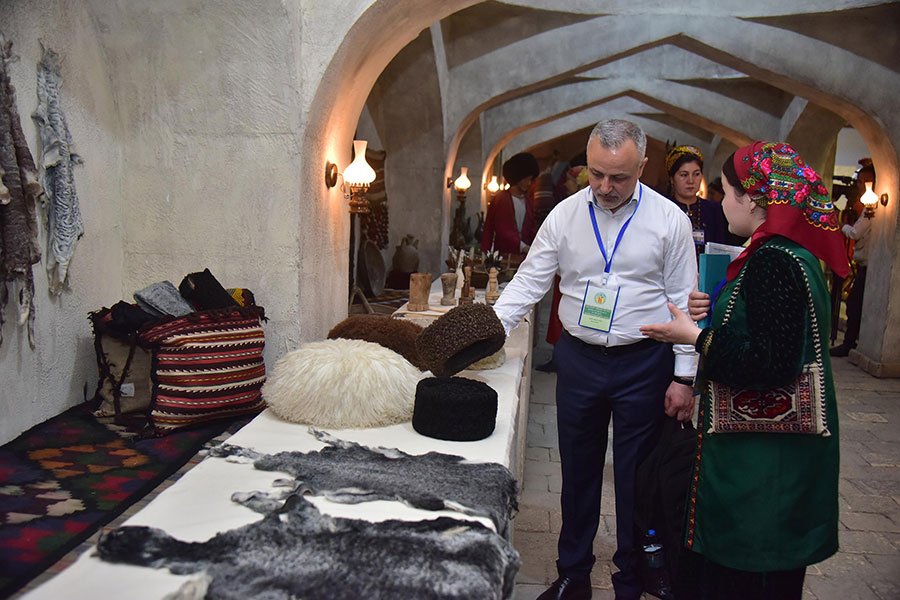 |
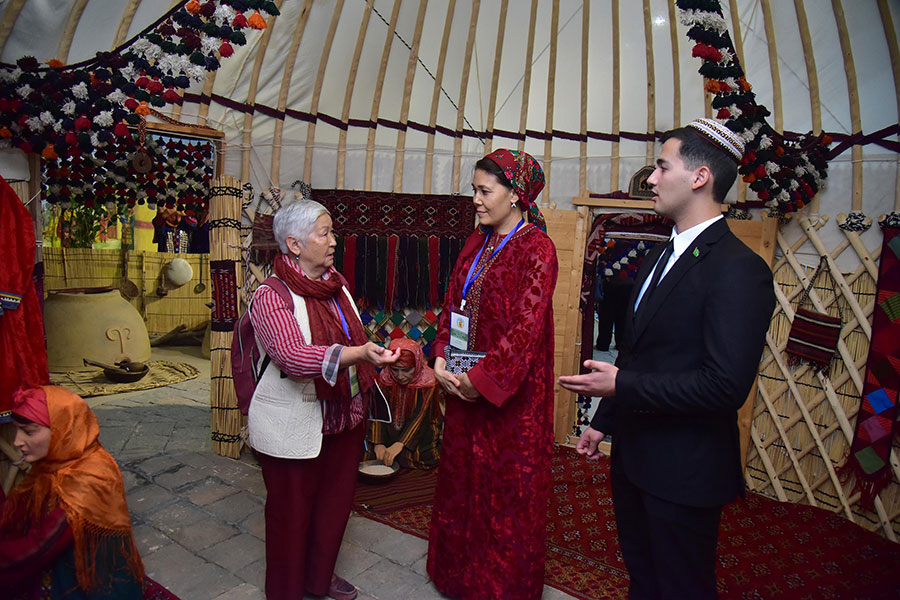 |
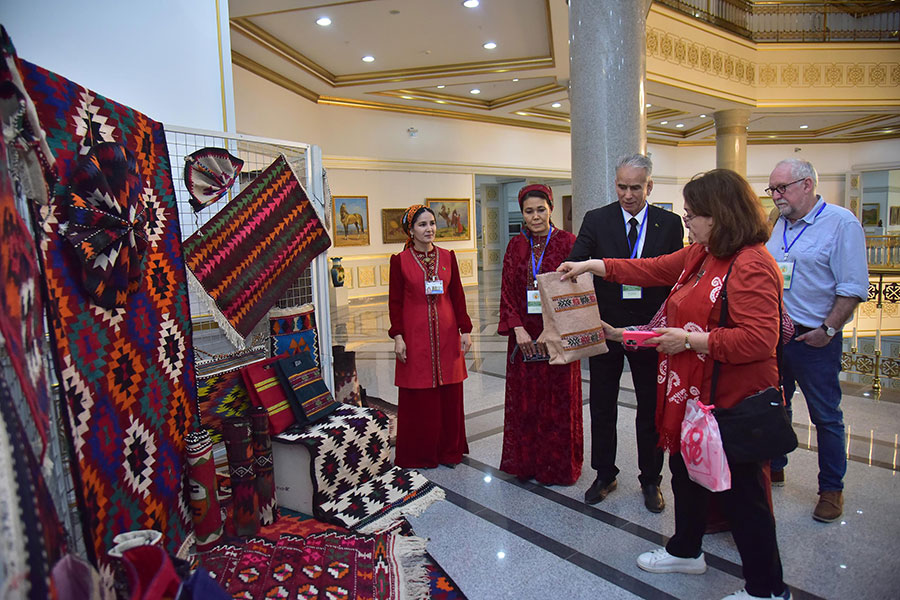 |
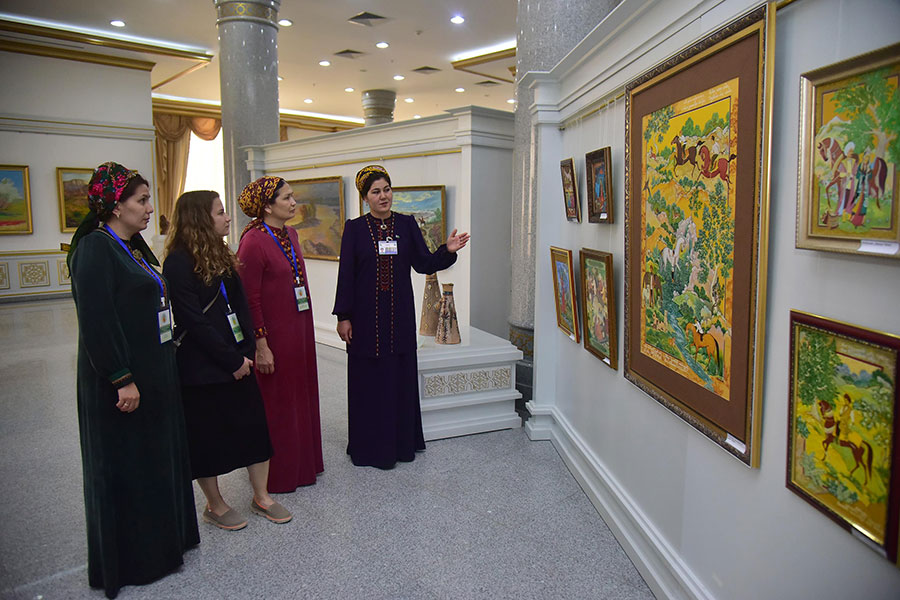 |
It is well known that numerous historical and architectural monuments are concentrated on the territory of Turkmenistan, which are carefully protected. These include the Amul fortress.
As noted during the conference, located on the territory of three countries – Turkmenistan, Uzbekistan and Tajikistan, the Zarafshan-Karakum corridor was the main section of the Great Silk Road in Central Asia, connecting all directions.
The transnational series, comprising 31 monuments located in Turkmenistan, Tajikistan and Uzbekistan, reflects the outstanding achievements in architecture and technology, monumental art and urban planning along this stretch of the legendary trade route from the 2nd century BC to the 16th century AD Representatives of the above-mentioned countries have done a lot of joint work to add a large number of sites to the World Heritage List. The Turkmen part of this large-scale project was developed with the participation of specialists from the National Department of Turkmenistan for the protection, study and restoration of historical and cultural monuments, and a number of State historical and cultural reserves.
On the Amul-Merv route, unique architectural monuments have been preserved – Turkmen medieval cities, fortresses, caravanserais, which are included in the UNESCO World Heritage List. Among them are the settlements of Amul-gala and Kushmeikhan, the fortification of Mansaf, the caravanserais of Kyene-gala, at-Takhmaladzh, Akcha-gala, Kyzylja-gala. Participants of the event were familiarized with the results of archaeological research carried out on these monuments by Turkmen archaeologists and during joint expeditions with foreign scientists, as well as with finds – evidence of the flourishing of the material culture of medieval Turkmen cities located along the Great Silk Road. Many of them became exhibits in one of the exhibition halls of the State Museum of the State Cultural Center.
The medieval settlement of Amul – the ruins of the fortress of the ruler of Amul – is located on the outskirts of the modern city of Turkmenabat. Its geographical position along the trade route was convenient for crossing the Amudarya.
The settlement was a vast square adobe fortress, surrounded by a wide moat with water. Each of its sides had gates, which were guarded by soldiers around the clock. Inside there was a square, barracks, food warehouses, houses and a palace with a beautiful garden. The fortress was surrounded by the dwellings of traders and artisans.
Amul was one of the largest centers of international trade. Here was an important section of the Great Silk Road, where caravan routes crossed from West to East (from Merv to Bukhara and further to China), as well as from North to South (from Gurganj to Balkh and further to India). In addition to trade routes, roads to Iran and Eastern Europe ran from here. Along with trade, crafts also developed.
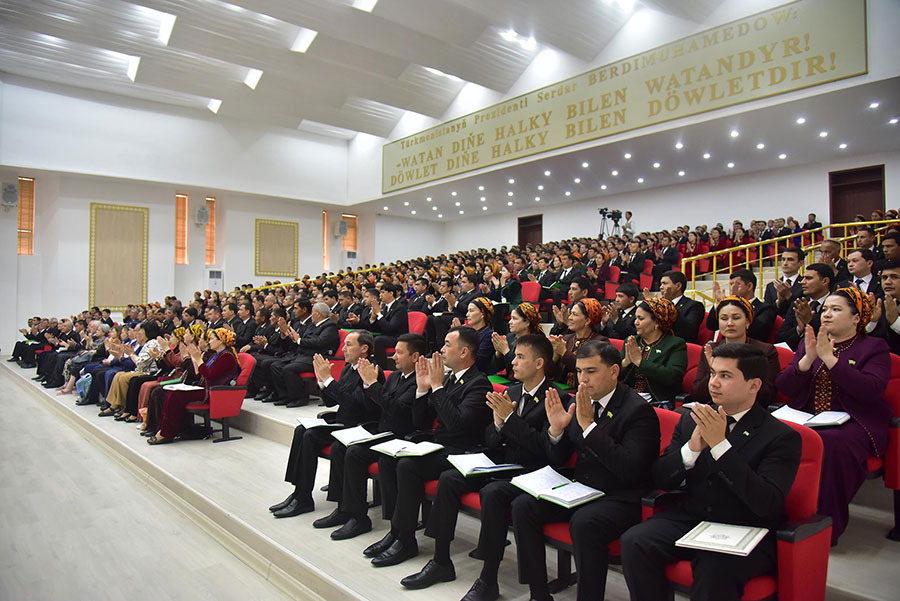 |
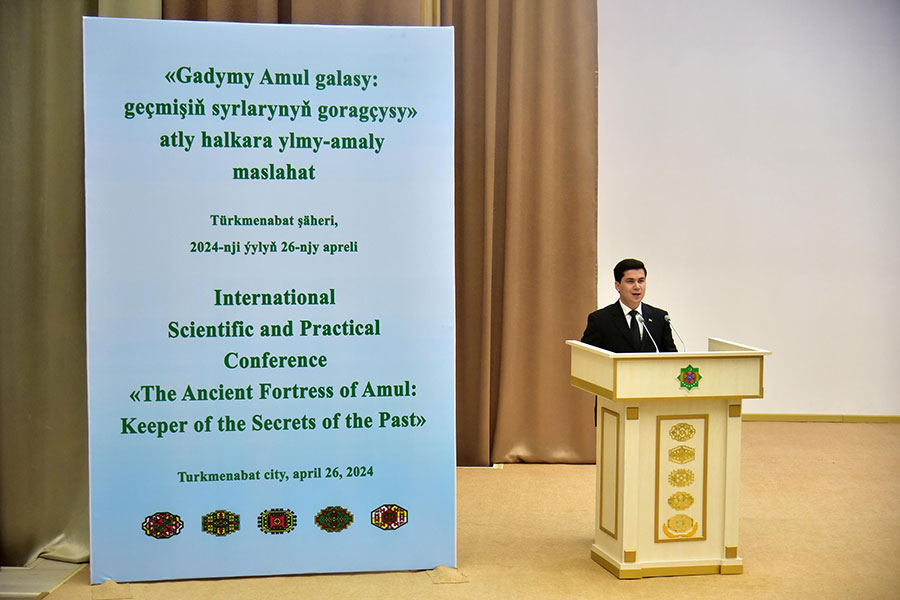 |
Today, the remains of the fortress have been preserved, which constitute a valuable historical monument. Having launched field work at the settlement, domestic scientists and specialists, together with foreign colleagues, are studying the richest archaeological material. They found many artifacts – fragments of glass and ceramics, a terracotta seal with an image of a deer. The very first settlement in this territory owes its appearance to the caravan trade routes of the Great Silk Road. It was the ancient settlement of Amul that gave the name to the Amudarya River.
The speakers emphasized that Turkmenistan is carrying out large-scale work to preserve for future generations historical, cultural and natural values that are an integral part of world civilization. Being a national treasure, ancient monuments reflect the spiritual and historical experience of the people, significant milestones of Turkmen statehood.
It is the fact that Ancient Merv, Kunyaurgench, and the Nisa fortress were included in the UNESCO World Heritage List that indicates global recognition of the highest value of the cultural heritage of the Turkmen people. These monuments, being a place of attraction for domestic and foreign scientists, demonstrate the grandeur and high level of development of ancient cities on the territory of Turkmenistan.
As the forum participants stated, work continues to nominate historical objects located along the main routes of the Great Silk Road, between such large ancient Turkmen cities as Dehistan, Nisa, Merv, Serakhs, Amul, Kunyaurgench, into this category.
At the same time, the main directions of interaction between Turkmenistan and UNESCO for 30 years were discussed. Such current topics as strengthening the role of our country in the divisions of this structure, expanding international scientific relations, opportunities for cooperation in digital projects and information exchange were touched upon.
Those present expressed their heartfelt gratitude to President Serdar Berdimuhamedov for the high level of organization of this event, as well as for large-scale complex activities aimed at further successful partnership of Turkmenistan with UNESCO, popularization of national heritage, deepening of fruitful cultural and humanitarian dialogue as a key factor in ensuring general well-being and prosperity.
Foreign guests had unforgettable impressions from visiting the ancient Amul fortress and getting acquainted with its glorious multi-thousand-year history.
At the end of the International Scientific and Practical Conference “The Ancient Fortress of Amul: Keeper of the Secrets of the Past”, its participants adopted an Address to the President of Turkmenistan.





